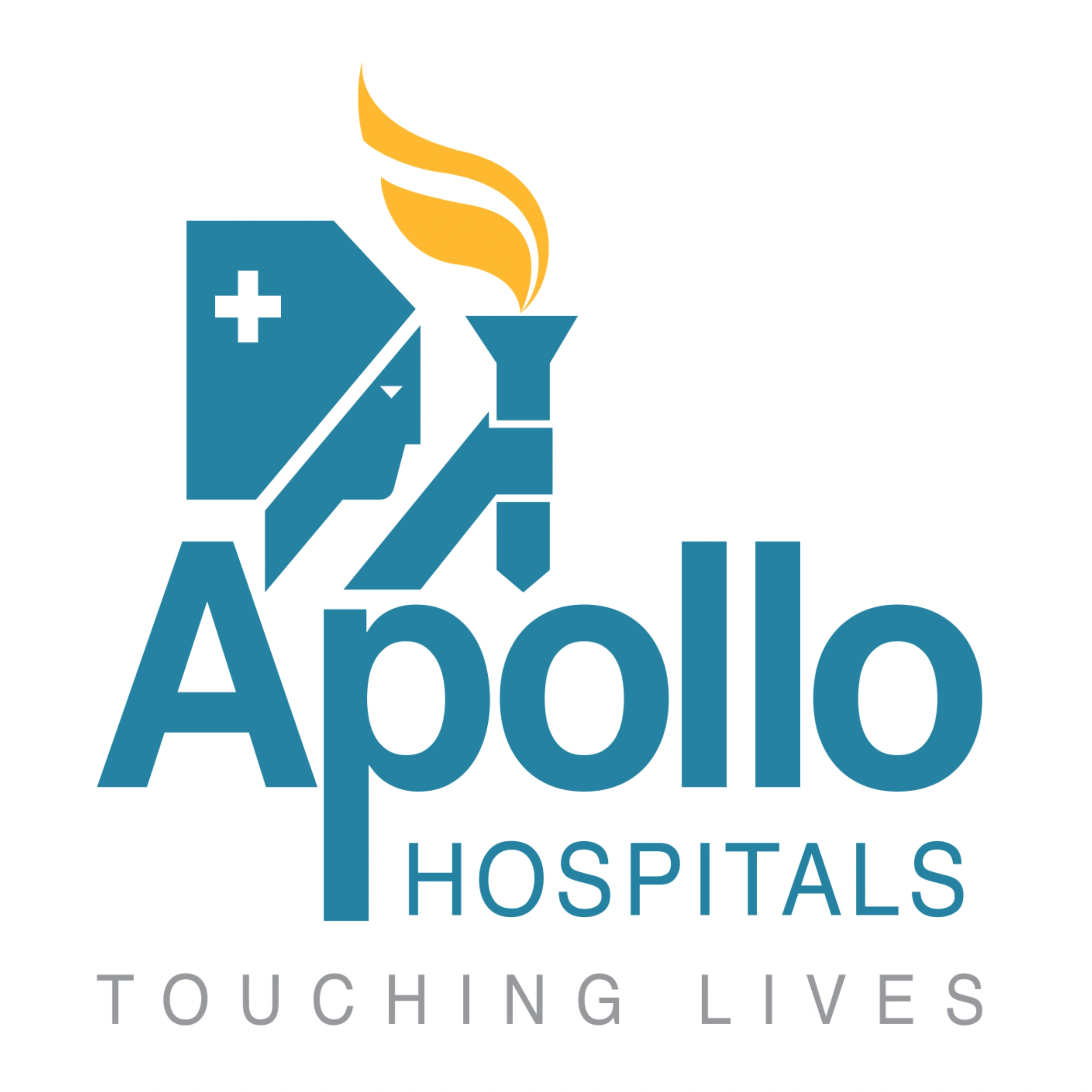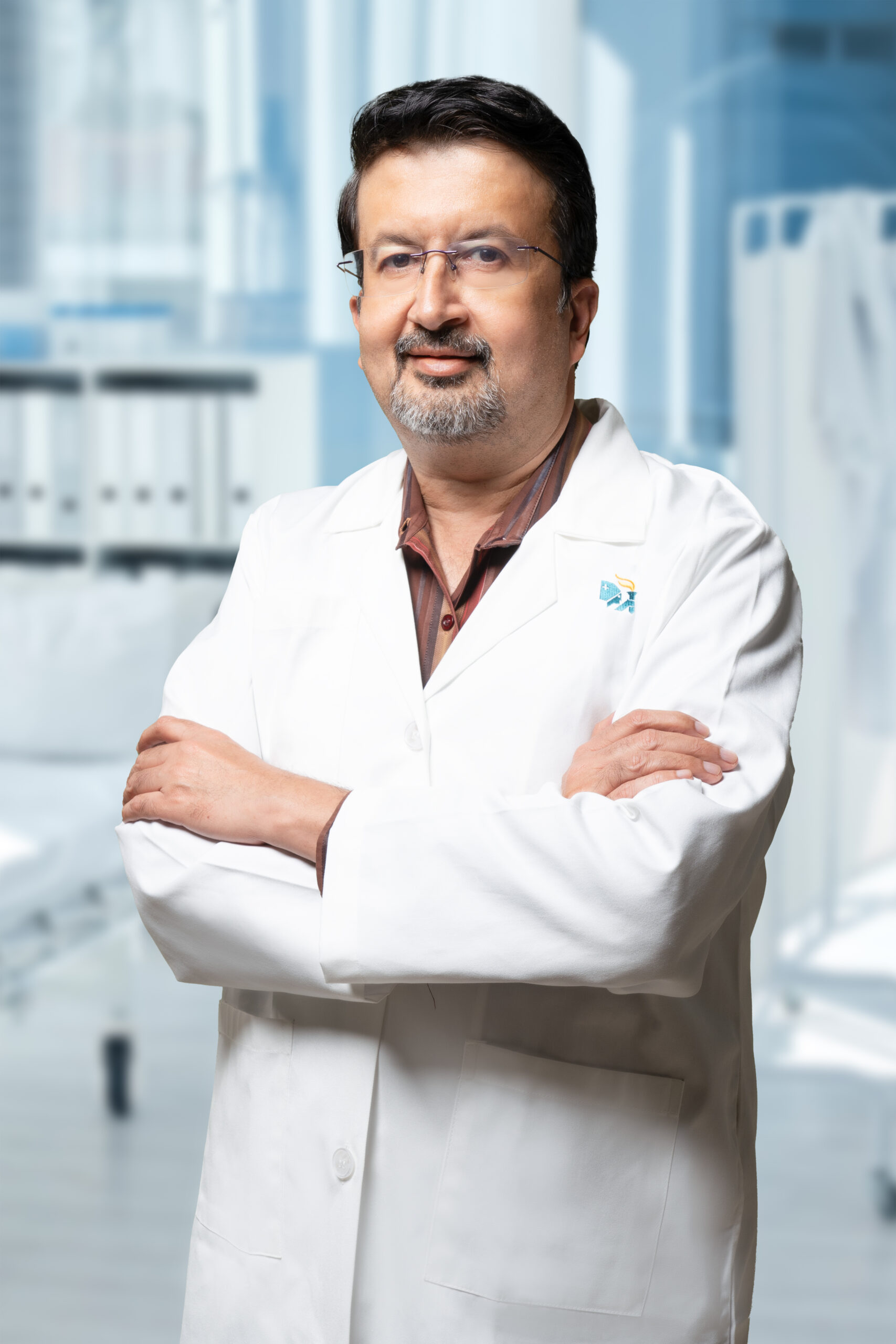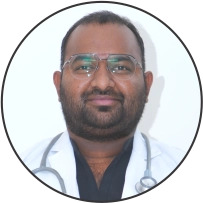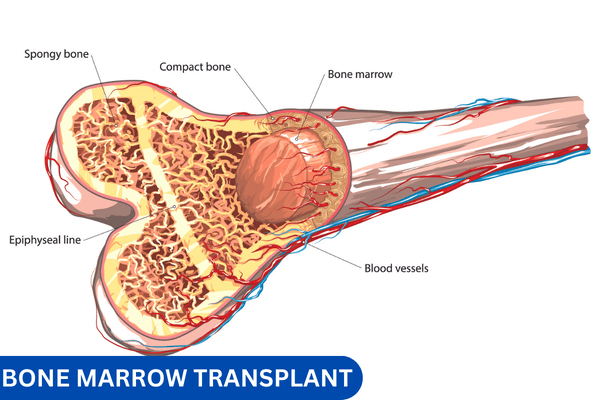What is a Bone Marrow Transplant?
A Bone Marrow Transplant (BMT) is a medical procedure that replaces damaged or diseased bone marrow with healthy stem cells. These stem cells help the body produce new blood cells, including red blood cells, white blood cells, and platelets.
BMT is commonly used to treat:
- Blood Cancers: Leukemia, Lymphoma, Myeloma
- Bone Marrow Diseases: Aplastic Anemia, Myelodysplastic Syndrome (MDS)
- Genetic Disorders: Sickle Cell Anemia, Thalassemia
- Other Cancers: Certain solid tumors requiring high-dose chemotherapy
Types of Bone Marrow Transplants
- Autologous Transplant
- Uses the patient’s own stem cells, collected before high-dose chemotherapy or radiation.
- Commonly used for multiple myeloma and some lymphomas.
- Allogeneic Transplant
- Uses stem cells from a donor whose tissue type closely matches the patient.
- Effective for conditions like leukemia and genetic disorders.
- Haploidentical Transplant
- A subtype of allogeneic transplant using a partially matched donor (e.g., family member).
- Expands donor options when a perfect match isn’t available.
- Umbilical Cord Blood Transplant
- Uses stem cells from umbilical cord blood, which are highly adaptable and less likely to cause rejection.
- Suitable for patients without a matched donor.
Who Needs a Bone Marrow Transplant?
A BMT is recommended for patients with:
- Blood Cancers: Acute or chronic leukemia, Hodgkin’s and non-Hodgkin’s lymphoma.
- Severe Bone Marrow Disorders: Aplastic anemia, myelofibrosis, or marrow failure.
- Genetic Blood Disorders: Sickle cell anemia, thalassemia.
- Immune System Disorders: Severe combined immunodeficiency (SCID).
Procedure for Bone Marrow Transplant
The transplant process involves the following steps:
1. Pre-Transplant Evaluation
- Comprehensive health checks, including blood tests, imaging, and bone marrow biopsy.
- Tissue typing for donor matching in allogeneic transplants.
2. Conditioning Therapy
- High-dose chemotherapy or radiation to destroy diseased cells and prepare the body for the transplant.
- May include reduced-intensity conditioning (RIC) for older or weaker patients.
3. Stem Cell Transplantation
- Infusion of healthy stem cells via an intravenous (IV) line.
- The stem cells travel to the bone marrow, where they begin producing healthy blood cells.
4. Engraftment
- The period during which transplanted stem cells settle into the bone marrow and start producing blood cells.
- Typically occurs within 2-4 weeks post-transplant.
5. Post-Transplant Recovery
- Monitoring for complications such as infections, graft-versus-host disease (GVHD), or organ damage.
- Regular follow-ups to track blood cell counts and immune function.
Benefits of Bone Marrow Transplant
- Potential Cure for Blood Disorders: Provides a chance for long-term remission or cure.
- Restored Blood Cell Production: Replaces diseased marrow with healthy cells.
- Improved Quality of Life: Reduces dependency on transfusions and supportive care.
- Broader Treatment Options: Allows for aggressive chemotherapy/radiation that would otherwise be intolerable.
Risks and Complications
While BMT offers life-saving potential, it also carries risks, including:
- Graft-versus-Host Disease (GVHD): A common complication in allogeneic transplants where donor cells attack the recipient’s body.
- Infections: Increased susceptibility due to weakened immune system post-transplant.
- Organ Damage: High-dose conditioning can sometimes affect the liver, lungs, or heart.
- Bleeding Disorders: Reduced platelet counts can lead to excessive bleeding.
Recovery and Aftercare
- Hospital Stay: Typically lasts 2-4 weeks post-transplant.
- Immune Recovery: Full immune system recovery can take 6 months to a year.
- Follow-Up Appointments: Regular visits for blood tests, imaging, and monitoring for complications.
- Lifestyle Changes:
- Avoiding exposure to infections.
- Eating a balanced diet to support recovery.
- Engaging in light exercise to regain strength.
Why Choose Healtour for Bone Marrow Transplant?
- Expert Hematologists: Highly experienced specialists with proven success rates.
- State-of-the-Art Facilities: Advanced transplant centers with infection-controlled environments.
- Global Network of Donors: Access to international donor registries for unmatched options.
- Comprehensive Support: Pre- and post-transplant care, including emotional and psychological counseling.
- Affordable Treatment Plans: Cost-effective options without compromising quality.
Contact Us for Life-Saving Bone Marrow Transplant Treatments
If you or a loved one are considering a Bone Marrow Transplant, let us guide you through the process with expert care and personalized support. At Healtour Solutions, we connect you with world-class hospitals and renowned hematologists to ensure the best outcomes at affordable costs.
FAQs About Bone Marrow Transplant (BMT)
- What is a Bone Marrow Transplant (BMT)?
A Bone Marrow Transplant is a medical procedure to replace damaged or diseased bone marrow with healthy stem cells to restore normal blood cell production. - What conditions require a Bone Marrow Transplant?
BMT is commonly used to treat blood cancers like leukemia and lymphoma, severe aplastic anemia, sickle cell anemia, thalassemia, and certain immune or metabolic disorders. - What are the types of Bone Marrow Transplants?
The two main types are:- Autologous Transplant: Uses the patient’s own stem cells.
- Allogeneic Transplant: Uses stem cells from a donor, usually a sibling or unrelated match.
- How is a donor match determined?
A match is determined through HLA (Human Leukocyte Antigen) typing, which ensures compatibility between the patient and donor. - What is the success rate of Bone Marrow Transplants?
Success rates vary depending on the condition, patient age, and type of transplant but generally range from 60% to 90% in treating certain blood cancers and genetic disorders. - How long does the BMT process take?
The entire process, including pre-transplant evaluations, conditioning therapy, transplant, and recovery, can take several weeks to months. - Are there risks or side effects involved?
Yes, potential risks include infections, graft-versus-host disease (GVHD) in allogeneic transplants, organ damage, and other complications. However, these are managed by expert medical teams. - How soon can a patient recover after a transplant?
Recovery time varies but typically ranges from 3 to 12 months. Full recovery of the immune system may take up to two years. - What is the cost of a Bone Marrow Transplant in India?
The cost varies based on the hospital, type of transplant, and other factors. In India, it is relatively affordable compared to other countries, often ranging from $15,000 to $30,000 USD. - How can Healtour Solutions help with Bone Marrow Transplants?
Healtour Solutions connects you with top hospitals, experienced hematologists, and cost-effective packages for Bone Marrow Transplants, ensuring a seamless and stress-free medical journey.






